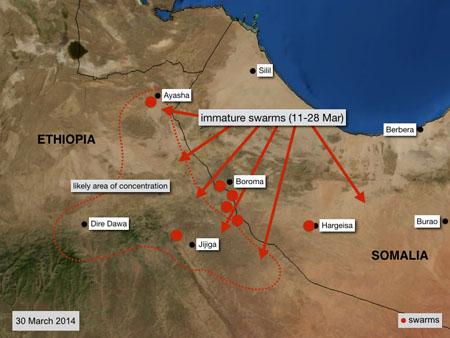You are here
'Jordan free of locust swarms'
By Hana Namrouqa - Apr 07,2014 - Last updated at Apr 07,2014

AMMAN — Insects spotted in different parts of the country that are causing concern are grasshoppers and not locusts, an Agriculture Ministry official said on Sunday.
“Jordan is free of locust swarms, and this insect that many people and farmers are worried about is the grasshopper,” Agriculture Ministry Spokesperson Nimer Haddadin told The Jordan Times.
The presence of grasshoppers during this time of the year is natural, Haddadin said, noting that the warm spring weather and the current high temperatures caused the spread of these insects.
Fidaa Rawabdeh, head of the prevention and plant health directorate at the ministry, explained that grasshoppers are similar to locusts in shape but their behaviour is different.
“Grasshoppers don’t form large groups and migrate in swarms; they don’t travel vast distances but remain around their mating locations, which are usually valleys, sand landscapes, side roads, parks and pastures,” Rawabdeh said.
In addition, grasshoppers are an indigenous species in Jordan and not invasive like locusts, she added, underscoring that grasshoppers rarely cause damage to trees or crops.
“A grasshopper's life cycle starts in spring when temperatures rise. The female lays eggs in the soil in grassy areas of uncultivated land. The hatching time is influenced by temperature and earlier hatching occurs in a warm spring,” she explained.
Haddadin said the ministry closely monitors the movement of locust swarms through the Commission for Controlling the Desert Locust, an affiliate of the Food and Agriculture Organisation.
“The latest information indicates that the desert locust is now at its spring mating location [Ethiopia and Somalia], far away from Jordan. In addition, locust movement during this period is towards the summer mating locations in central Africa,” Haddadin noted.
A small number of locust swarms appeared in some of the Kingdom's southern regions in March last year.
Agriculture Ministry teams, together with the Jordan Armed Forces, sprayed pesticides over the affected areas and completely eliminated the destructive insects.
The locusts that entered Jordan were remnants of the swarms that invaded Egypt, Saudi Arabia and Israel at the time.
Related Articles
AMMAN — The Ministry of Agriculture is spraying agricultural lands in Tafileh Governorate, some 180km southwest of the capital, with pestici
AMMAN — The Agriculture Ministry has found no desert locusts in the Kingdom, according to a recent ministry statement seen by The Jordan Tim
AMMAN — The Ministry of Agriculture on Saturday said it was taking necessary measures to deal with the possibility of locusts entering the K
















